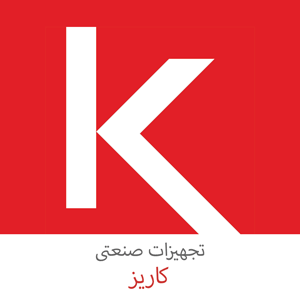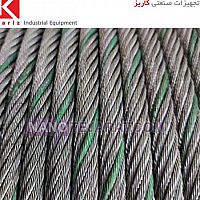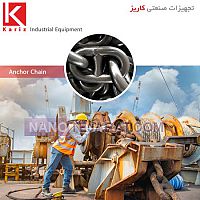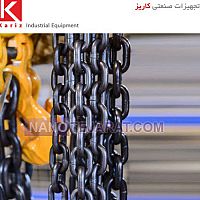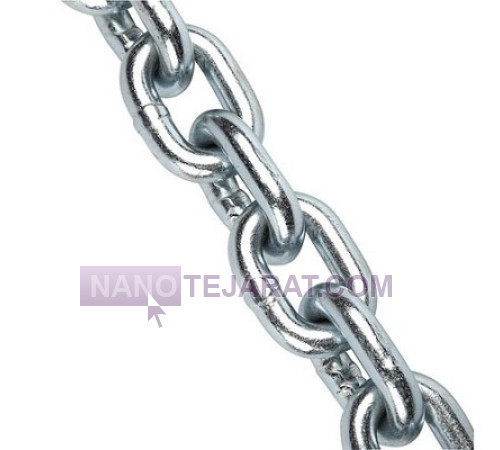
Steel Chain , Iran
Import, production and distribution of all kinds of steel chains in Kariz industrial equipment.
Sale of steel chains
Sale of galvanized steel chain
Sale of stainless steel chain
Sale of G80 grade steel chains
Selling American chains
Sale of grade 30 galvanized chains
Sale of bag chains
Selling iron chains
TYPES OF CHAIN GRADES
Industrial chains consist of linked segments of durable metal, such as stainless steel, galvanized steel, and brass. They are available in a wide range of sizes and strengths to lift and transport materials across a diverse set of applications.
The tensile strength of the base material—i.e., the ultimate breaking strength—determines the rating and grade given to the particular chain. The greater the breaking strength, the higher the grade, and vice versa. The grade indicated for a chain helps industry professionals identify the types of applications for which it is appropriate. For example, the strength of galvanized chains relies on the amount of carbon present in the metal as grade 30 chain has less carbon, it is weaker than grade 40 chain and suitable for service duty applications rather than heavy-duty applications.
At Armstrong / Alar Chain Corporation, we pride ourselves on our extensive knowledge and experience with metal chains, hooks, fasteners, wire rope, and accessories. Our experts understand the uses and limitations of chains and can offer advice on the types and attachments suitable for virtually any application.
PROPERTIES OF DIFFERENT CHAIN GRADES
When selecting a chain for an application, it is important to consider its grade. Each chain grade demonstrates different properties that make it suitable for some applications, but not for others. An analysis of the working load limit WLL of the chain— generally one-third the weight of the break strength—can help industry professionals determine its strengths and weaknesses. Below we outline some of the most common chain grades and their properties and uses.
Grade 30 Chain
Grade 30 chain is widely used for general purpose use in agricultural, residential, and industrial applications. This grade is composed of durable carbon steel and has the lowest tensile strength of all the chain grades. While it should not be used for heavy-duty towing or overhead lifting, it often finds application as the following:
Cargo lashing and tie-downs
Chain guard rails on walking trails
Crowd control equipment
Playground equipment components
Vehicle tow chains for lighter equipment
Grade 40 Chain
Compared to Grade 30 chain, Grade 40 chain has a higher carbon content and therefore exhibits a higher tensile strength. While similar in strength to Grade 43 chain, this grade has smaller chain link dimensions. It is used primarily as boat windlasses but also finds application in mines, oil drilling fields, lumber yards, and OEM facilities. Like Grade 30, this chain is not approved for overhead lifting.
Grade 43 Chain
Grade 43 chain is made from higher carbon steel and demonstrates the same strength levels as grade 40, except with larger chain links. This grade’s higher strength allows it to accommodate DOT specifications for use as tie-downs in the trucking industry. While it cannot be used in overhead lifting applications like Grade 30 and 40, it is appropriate for securing logging loads for on-road transport and vehicle towing.
Grade 70 Chain
Grade 70 chain is composed of heat-treated carbon steel, making it approximately 20% stronger than Grade 43 chains. This grade is easily recognizable by its yellow chromate gold plating finish. It is typically used to secure heavier loads for on-road transport and equally suitable for use in logging and towing, especially for applications that require a chain with greater strength than Grade 43 can offer. Although this chain has significantly higher tensile strength than lower grades, it is not recommended for use in overhead lifting applications.
Grade 80 Chain
Grade 80 chain is fully engineered for safe use in overhead lifting applications and has been approved by the Occupational Safety and Health Administration OSHA for this purpose. This grade is composed of heat-treated alloy steel and can be coated with a black armor protective finish to enhance durability and service life. It is designed specifically for use in heavy-duty towing and overhead lifting.
Grade 100 Chain
Like Grade 80 chain, Grade 100 chain has been engineered for exceptional strength and is approved for overhead lifting applications. While the heat-treated alloy steel used in Grade 100 is approximately 25% stronger than Grade 80, there are some reports of decreased tensile strength at low temperatures. The exceptional strength of the base metal allows for the use of smaller diameter chains with a significantly higher strength-to-weight ratio than other alloy chains. Additionally, the material hardness reduces inner wear on the links for longer service life.
Stainless Steel Types 304 and 316 Chain
In addition to carbon steel, manufacturers also employ stainless steel to produce chains with greater corrosion resistance. In particular, they often use 304 and 316 stainless steel grades, which exhibit a higher carbon content than other stainless steel alloys and, therefore, higher tensile strength. The WLLs for stainless steel chains are more dependent on the chain size, with load capacities ranging between 375 pounds to 23,000 pounds.
APPLICATIONS AND INDUSTRIES SERVED BY DIFFERENT CHAIN GRADES
Due to their varying material attributes, each chain grade finds use in different applications and industries. For example:
Grade 30. Grade 30 chain is most commonly used for general purposes. It is a low-cost option for lightweight applications in construction, agriculture, and marine industries.
Grade 43. The higher strength of Grade 43 accommodates heavier general use, including securing larger and heavier items in the logging, agriculture, automotive towing, and marine industries.
Grade 70. Approximately 25% stronger than Grade 43, Grade 70 is ideal for securing and towing large or heavy loads for road transport applications in the trucking, logging, and highway construction industries.
Grade 80. Approved for overhead lifting, Grade 80 chain is often employed for slings and heavy-duty towing in the construction, automotive, aerospace, and manufacturing industries.
Grade 100. Grade 100 chain is also approved for overhead lifting and used for loads that are heavier and require greater strength than Grade 80 can handle. It is particularly useful for overhead lifting in construction and industrial manufacturing.
Grade 120. Grade 120 chain exhibits the strongest tensile strength of all steel alloy chains and is used for exceptionally heavy overhead lifting.
SELECTION CONSIDERATIONS FOR DIFFERENT CHAIN GRADES
The key to finding the chain best suited for an application is understanding how the chain will be used, how it is expected to perform, and the factors—such as weight and pressure—acting on it and their effects. These considerations determine the type of chain, including size and strength, that accommodate the requirements and restrictions of the particular application. For example, for overhead lifting, industry professionals may choose to use a Grade 80 or Grade 100 chain but not a Grade 40 or 43 chain. Other concerns to keep in mind are any relevant industry standards and regulations, such as DOT or OSHA requirements.
SUPERIOR CHAIN PRODUCTS FROM ARMSTRONG / ALAR
At Armstrong / Alar, we understand the need for an intimate understanding of industry standards and regulations. With more than 20 years of experience, we are proud to offer our expertise to help you find the perfect chains, hooks, fasteners, and related accessories to ensure that you have the most secure and reliable chain system. Our highly skilled engineers and specialists are pleased to work one-on-one with your team to help you determine the best system for even the most complex and challenging applications.
Our products are produced from the highest quality materials—including brass, galvanized steel, steel, and stainless steel—and are thoroughly tested for strength and reliability. Our chain product offerings include:
Welded chains
Weldless chains
Beaded chains
Curb chains
NEWS
Stainless Steel vs Galvanized vs Bright: What’s the Best Type of Chain?
January 1, 1970by Admin
Stainless-Steel-Vs-Galvanized-Vs-Bright-Chains.jpg
Industrial chains are one of the most versatile pieces of hardware supplies. They can be used in industrial applications, construction, and for everyday around-the-house purposes. If you are looking to purchase an industrial chain, you will probably notice that there are a lot of options on the market.
In addition to varying chain lengths, grades, and link diameters, there are three basic types of finishes for chains: stainless steel, galvanized, and bright.
If you are not familiar with industrial hardware supplies, you are probably curious as to what these finishes are, why they matter, and, of course, which one you should buy.
Each style of the industrial chains has its benefits and drawbacks. Furthermore, the breaking strengths and durability ratings vary between the different types of metals – so choosing the wrong one could wind up creating major problems.
So, here are few things that you must know about various types of industrial chains before making a purchase for any project.
Stainless Steel
As the name implies, stainless steel is a type of steel, meaning that the alloy metal is primarily iron-based. Stainless steel chain also contains at least 10.5% Chromium, which is an element that creates a thin layer of oxide on the exterior. This gives stainless steel a shiny surface while also protecting it from corrosion and rust.
Stainless steel may also have carbon, silicon, manganese, or nickel mixed in for added strength and improved corrosion resistance. Stainless steel is also known for being:
Long-lasting
Easily cleaned
Extremely temperature resistant
Preferred for aesthetic reasons
Environmentally friendly and reusable
Stainless steel chain is formed by melting together all of the raw materials in a furnace to form a molten alloy. This typically takes between 8 to 12 hours until all of the materials are completely melted. The steel is then formed into the desired link diameter and forged together to form a chain.
Some of the most popular stainless-steel chain models include:
Grade 43 High Test Chain
Stainless Steel Type 304
Stainless Steel Type 316
G-4 Windless Chain
Although the stainless steel chain is certainly the strongest style, there are some downsides. First, it is more expensive than other types of chains – because the forging process is more intensive and requires more raw materials. The material also shows dirt, smudges, and scratches quite easily.
Galvanized Chain
Grade 30 Proof Coil Chain
The Galvanized chain is made of traditional steel which is then covered in zinc to prevent the metal from rusting or corroding. The galvanization process helps to extend the longevity of the chain and make it highly durable for applications that would typically corrode unprotected metal, such as on ships, near water, or in moist environments.
Galvanized chain is a popular choice for many industrial applications as it is known for:
Long-lasting durability
High strength
General-purpose utility
Corrosion resistance
There are several galvanization processes that are used to coat chains.
The first – and generally most common – is hot-dip galvanizing. This involves coating the metal chain in molten zinc so it bonds strongly to the metal for a thick, strong covering. This also creates a distinct pattern known as “spangle” as it appears to be semi-crystalized.
Electroplated galvanization is another common method where an electric current is used to positively charge zinc ions so it attaches to the metal. This creates an extremely thin, even layer.
Metal may also be galvanized with z zinc spray or with powdered zinc which is then heated until it bonds with the metal. However, these methods are more commonly used with smaller metal hardware pieces as opposed to chains.
Some of the most popular galvanized metal chains include:
Hot Dipped Galvanized G-4 Windlass Chain
Grade 43 High Test Chain
Grade 30 Proof Coil Chain
Galvanized metal tends to be the least expensive type of chain, and it can be extremely long-lasting if it is taken care of properly. However, the zinc coating may eventually wear off or chip, particularly if the chain is exposed to lots of friction or movement.
Bright / Self-Colored
Bright Self Colored Chain
Bright chain also commonly called self-colored means that the metal material is not coated with any protective layer, leaving the metal exposed.
Since this uncoated steel chain cannot be exposed to water, moisture, or corrosive environments, it is commonly used for internal securement – which is protected from these types of elements. Bright chains may also be painted or finished with a lacquer.
Some of the most common bright/self-colored chains from Elite Sales include:
Grade 30 Proof Coil Chain
Grade 43 High Test Boomer/Binding Chains
Grade 80 Alloy Chain
Self-Colored Grade 43 Chain
Since bright chains do not have any finishes or coatings, it is less expensive than other types – particularly stainless steel. While this lack of protective coating does make the metal quite susceptible to corrosion and rusting, bright or self-colored chains are also stronger and more durable than galvanized steel.
Types of Projects
As each style of the industrial chains has its own strengths and weaknesses, some are made for specific applications while others are a bit more versatile.
For example, galvanized and stainless steel chain are best for uses in environments that could be exposed to water or moisture, such as:
Outdoor buildings
Boats
Docks
Water storage areas
Damp areas, such as basements
Bright/self-colored chains are far too prone to rusting and corrosion to be used near water, so they are generally best for applications like:
Internal joinery
Logging
Towing
Tie downs
Conclusion
When it comes to choosing an industrial hardware supplier for any type of chain, it is always best to consult an expert to help you find the exact materials you need for any project or application.
That’s why you can count on Elite Sales.
Our experienced, knowledgeable team members know everything there is to know about indust
You can order and buy Steel Chain from Iran by contacting us through whatsaap and email.
WEBSITE: Steel Chain Iran

